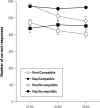The effects of a nighttime nap on the error-monitoring functions during extended wakefulness
- PMID: 22654206
- PMCID: PMC3353047
- DOI: 10.5665/sleep.1892
The effects of a nighttime nap on the error-monitoring functions during extended wakefulness
Abstract
Study objectives: To examine the effects of a 1-hr nighttime nap, and the associated sleep inertia, on the error-monitoring functions during extended wakefulness using the 2 event-related potential components thought to reflect error detection and emotional or motivational evaluation of the error, i.e., the error-related negativity/error-negativity (ERN/Ne) and error-positivity (Pe), respectively.
Design: Participants awakened at 07:00 the morning of the experimental day, and performed a stimulus-response compatibility (arrow-orientation) task at 21:00, 02:00, and 03:00.
Setting: A cognitive task with EEG data recording was performed in a laboratory setting.
Participants: Twenty young adults (mean age 21.3 ± 1.0 yr, 14 males) participated.
Interventions: Half of the participants took a 1-hr nap, and the others had a 1-hr awake-rest period from 01:00-02:00.
Measurements and results: Behavioral performance and amplitude of the Pe declined after midnight (i.e., 02:00 and 03:00) compared with the 21:00 task period in both groups. During the task period starting at 03:00, the participants in the awake-rest condition reported less alertness and showed fewer correct responses than those who napped. However, there were no effects of a nap on the amplitude of the ERN/Ne or Pe.
Conclusions: Our results suggest that a 1-hr nap can alleviate the decline in subjective alertness and response accuracy during nighttime; however, error-monitoring functions, especially emotional or motivational evaluation of the error, might remain impaired by extended wakefulness even after the nap. This phenomenon could imply that night-shift workers experiencing extended wakefulness should not overestimate the positive effects of a nighttime 1-hr nap during extended wakefulness.
Keywords: Nighttime nap; error monitoring; error positivity; error-related negativity/error negativity; night work.
Figures




Similar articles
-
Performance monitoring during sleep inertia after a 1-h daytime nap.J Sleep Res. 2010 Sep;19(3):436-43. doi: 10.1111/j.1365-2869.2009.00811.x. Epub 2010 Mar 31. J Sleep Res. 2010. PMID: 20374446
-
The effects of extended nap periods on cognitive, physiological and subjective responses under simulated night shift conditions.Chronobiol Int. 2018 Feb;35(2):169-187. doi: 10.1080/07420528.2017.1391277. Epub 2017 Nov 16. Chronobiol Int. 2018. PMID: 29144168
-
Duration of sleep inertia after napping during simulated night work and in extended operations.Chronobiol Int. 2012 Jul;29(6):769-79. doi: 10.3109/07420528.2012.686547. Chronobiol Int. 2012. PMID: 22734577
-
Age-related differences in the error-related negativity and error positivity in children and adolescents are moderated by sample and methodological characteristics: A meta-analysis.Psychophysiology. 2022 Jun;59(6):e14003. doi: 10.1111/psyp.14003. Epub 2022 Feb 6. Psychophysiology. 2022. PMID: 35128651 Free PMC article. Review.
-
Time to wake up: reactive countermeasures to sleep inertia.Ind Health. 2016 Dec 7;54(6):528-541. doi: 10.2486/indhealth.2015-0236. Epub 2016 May 18. Ind Health. 2016. PMID: 27193071 Free PMC article. Review.
Cited by
-
Overnight sleep loss and "executive" decision making-subtle findings.Sleep. 2013 Jun 1;36(6):823-4. doi: 10.5665/sleep.2700. Sleep. 2013. PMID: 23729923 Free PMC article. No abstract available.
-
Compensatory Neural Recruitment for Error-Related Cerebral Activity in Patients with Moderate-To-Severe Obstructive Sleep Apnea.J Clin Med. 2019 Jul 22;8(7):1077. doi: 10.3390/jcm8071077. J Clin Med. 2019. PMID: 31336598 Free PMC article.
-
A 20-min nap in athletes changes subsequent sleep architecture but does not alter physical performances after normal sleep or 5-h phase-advance conditions.Eur J Appl Physiol. 2014 Feb;114(2):305-15. doi: 10.1007/s00421-013-2776-7. Epub 2013 Nov 26. Eur J Appl Physiol. 2014. PMID: 24276580
-
Person-directed, non-pharmacological interventions for sleepiness at work and sleep disturbances caused by shift work.Cochrane Database Syst Rev. 2016 Aug 23;2016(8):CD010641. doi: 10.1002/14651858.CD010641.pub2. Cochrane Database Syst Rev. 2016. PMID: 27549931 Free PMC article.
References
-
- Gehring WJ, Coles MGH, Meyer DE, Donchin E. The error-related negativity: an event-related brain potential accompanying errors. Psychophysiology. 1990;27:S34.
-
- Gehring WJ, Goss B, Coles MGH, Meyer DE, Donchin E. A neural system for error detection and compensation. Psychol Sci. 1993;4:385–90.
-
- Falkenstein M, Hohnsbein J, Hoormann J, Blanke L. Effects of errors in choice reaction tasks on the ERP under focused and divided attention. In: Brunia CHM, Gaillard AWK, Kok A, editors. Psychophysiological brain research. Tilburg: Tilburg Univesity Press; 1990. pp. 192–5.
-
- Falkenstein M, Hohnsbein J, Hoormann J. Event-related potential correlates of errors in reaction tasks. In: Karmos G, Molnár M, Csépe V, Czigler I, Desmedt JE, editors. Perspectives in event-related potential research. EEG Supplement 44. Amsterdam: Elsevier; 1994. pp. 287–96. - PubMed
-
- Gehring WJ, Coles MG, Meyer DE, Donchin E. A brain potential manifestation of error-related processing. In: Karmos G, Molna′r M, Cse′pe V, Czigler I, Desmedt JE, editors. Perspectives in event-related potential research. EEG Supplement 44. Amsterdam: Elsevier; 1994. pp. 261–72. - PubMed
Publication types
MeSH terms
LinkOut - more resources
Full Text Sources
Research Materials

